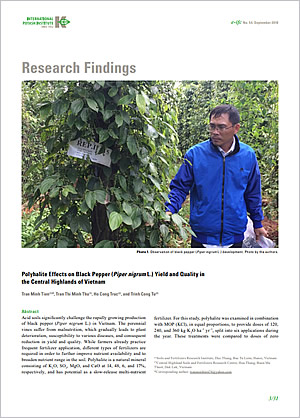Polysulphate pushes up black pepper yield in Vietnam
 Pepper production in Vietnam is shown to be greatly helped by the use of Polysulphate: improving vine health, resistance to pest attack, yield and quality.
Pepper production in Vietnam is shown to be greatly helped by the use of Polysulphate: improving vine health, resistance to pest attack, yield and quality.
Vietnamese pepper production in trouble
Pepper consumption worldwide has risen 60% in the last decade and the fastest increase is in the Far East where demand has risen by 200% in ten years. Vietnam has emerged as a major pepper producer. However many Vietnamese farmers are struggling to maintain quality. Precise crop nutrition and disease are becoming major limiting factors.
Proving the benefits of Polysulphate to pepper
In recent research carried out by the Soils and Fertilizer Research Institute and the Central Highland Soils and Fertilizers Research Centre in Vietnam, supported by the International Potash Institute (IPI), it was found that inadequate nutrition leads to plant deterioration and susceptibility to disease and insect pest attack.
By replacing the conventional fertilizer strategy with bi-monthly applications of Polysulphate, the supply of potassium was greatly improved. The accompanying calcium, magnesium and sulphur also contained in this natural mineral fertilizer were also proved to have significant beneficial effects on the pepper vines.
Pepper production can get back on track
Trialling the alternative fertilizer strategy across the pepper-growing areas of the Central Highlands of Vietnam gives a blueprint to follow for many other farmers in Vietnam and other pepper-growing parts of the world.
The balance of essential nutrients in Polysulphate strengthened the black pepper vines against mealybug attacks, supported better crop performance, and significantly improved yield and quality, which resulted in higher profits for the farmers.
Read the research results in full.
